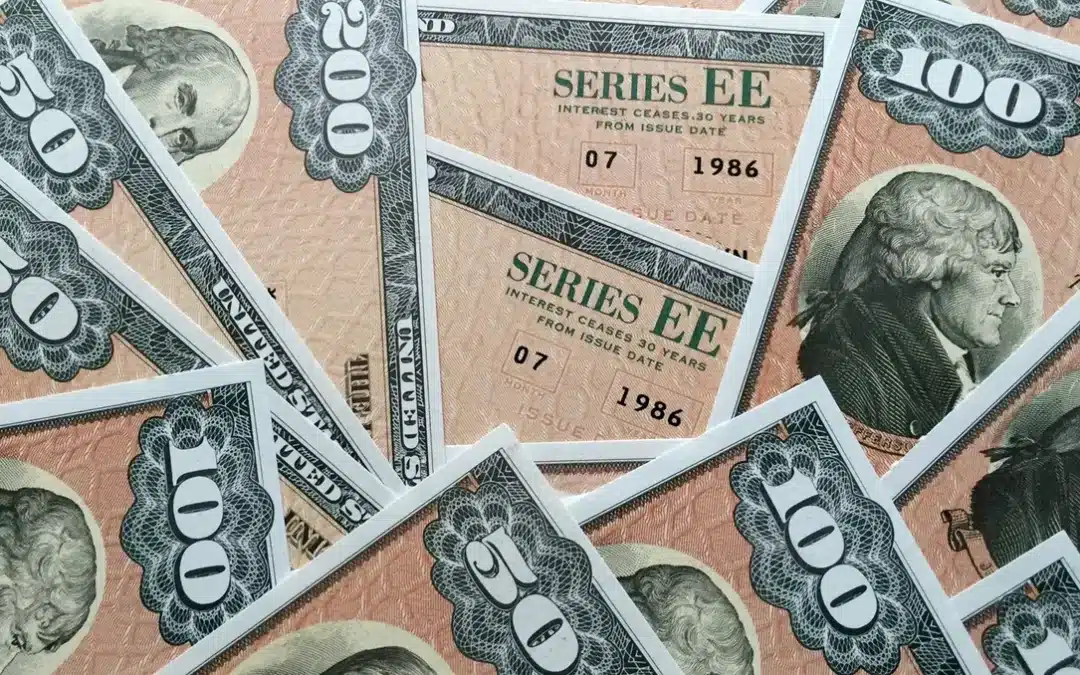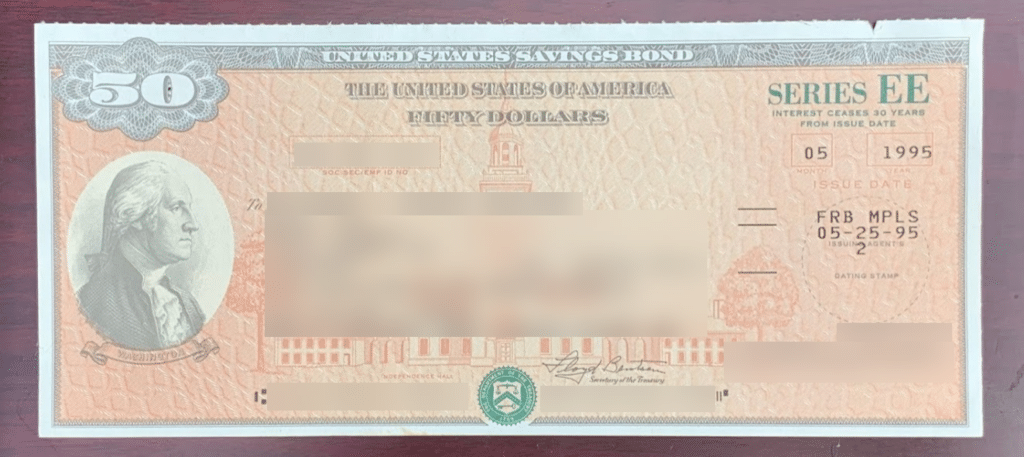Grandma and the EE Savings Bond Gift
My family has an unusual tradition–my grandfather self-built two houses–one completed in 1957 and another in 1996. Yes, he built them, hammer-swinging and all, with family help. My father has also done the same–first completing construction in 1986, and then again recently in 2019.
So last year my dad and stepmom moved to their new home, after 33 years in the prior house. After spending that many years in the same house, you might expect that there are quite a few things that haven’t been seen for years. Junk accumulates. They finally had to go through all that stuff.
When I graduated from high school in 1995, my grandmother bought me a gift. For 24 years, I had no idea that this gift existed, but when going through all that stuff, my stepmother found a U.S. EE savings bond in my name at the very back of the home safe.
Pretty cool! I got some money, that I had no idea was mine. There it was, a beautiful salmon-colored savings bond, with $50 in the corner. See, Grandma had spent $25 on an EE savings bond so that I might have more money at some point in the future.
I’m grateful for this bond, but perhaps not in the ways you might expect. Of course, it wasn’t clear 25 years ago that I would become a finance person. There’s just so much to say about this kind of gift.
Lesson 1: Saving is important
The idea that my grandmother would give a gift that could only be valuable in the future is really neat. It speaks to the importance of saving for the future. The only way one can save is to spend less than one earns, and a habit of that is the single most determinant factor in achieving financial freedom. And I’m pretty certain that had she simply given me $25 in cash, my 18-year old self would have spent it on some kind of consumption purchase–a game, fast food, gas money or something like that. In fact, my 6-year-old daughter just did the same with nearly the same amount of money–she just had to have a new scooter (we have some parenting work to do here to get her to save)
Lesson 2: Conservativism is often overrated
“There are few wealthy pessimists”. – Jack Butcher
Now, I can’t hold this against Grandma. She had her own life experiences, perhaps even a tad influenced by the late aftermath years of the great depression, and those experiences might have caused her to be afraid of losing money with investments. She grew up in a farming economy, and the truth is I don’t know that much about her views on investing.
But I know this–an EE savings bond is a really conservative investment. 25 years later it’s still only worth $54 and change.
So I can’t help but think about “what if?” What if Grandma had instead spent that $25 on that bond but put the money in, say, a single share of Walmart, which had appeared not that far from her rural home in the 1990s? Or Home Depot? Kimberly Clark (a company many in my home region have a lot of experience with)? Sure, maybe she’d have picked a company that went bust, and I’d have zero today. Even if that happened, I’d bet that the lesson learned would be far greater than the money lost. Instead, what if Grandma would have just bought the old staple, Vanguard 500 U.S. market fund?
In most of those cases, I’d have $200-$700 dollars now, not $54–or 4 to 8 times more money!! That $25 could have been worth so much more if Grandma had invested in stocks. As Richard Bernstein once wrote, “No one ever grew wealth being scared” (2016).
Indeed, much of a person’s long-term wealth will simply be determined by their ability to “be less scared” and let long-term trends like human innovation power their portfolio. Focusing too much on stability to avoid losses and being freaked out by downward moves in stock markets can really hurt your long-term dollars if it causes you to be more conservative than you should be. Paying too much attention to daily gyrations is more hurtful than helpful.
I’m grateful for this found money, no doubt. I haven’t cashed it in because of what this bond symbolizes, though. That’s because, you see, I’m also saddened by what could have been created out of that $25, not for me personally, but because this is going on all over the world with far more dollars at stake. Many are missing out on what could be the opportunity to gain their own financial freedom. Sure, part of that is simply because many can’t or don’t ever find a way to save, even just a little. But after that, so many people often underinvest their money to their long-term detriment, mostly because they’re scared, misinformed, and/or too devoted to conservative investments (or crummy financial products sold as “investments” that play to an investor’s fear of loss but mostly just make money for the company that sold it).
To keep up with the cost of living, to gain financial freedom, and to live a better retirement, you’ll likely be better off investing your money if you balance being uncomfortable along with a desire for safety. Finding a way to balance that is the key.
Jacobson & Schmitt Advisors, LLC (“JSA”) is a registered investment advisor. Advisory services are only offered to clients or prospective clients where JSA and its representatives are properly licensed or exempt from licensure. The information provided is for educational and informational purposes only and does not constitute investment advice and it should not be relied on as such. It should not be considered a solicitation to buy or an offer to sell a security.








